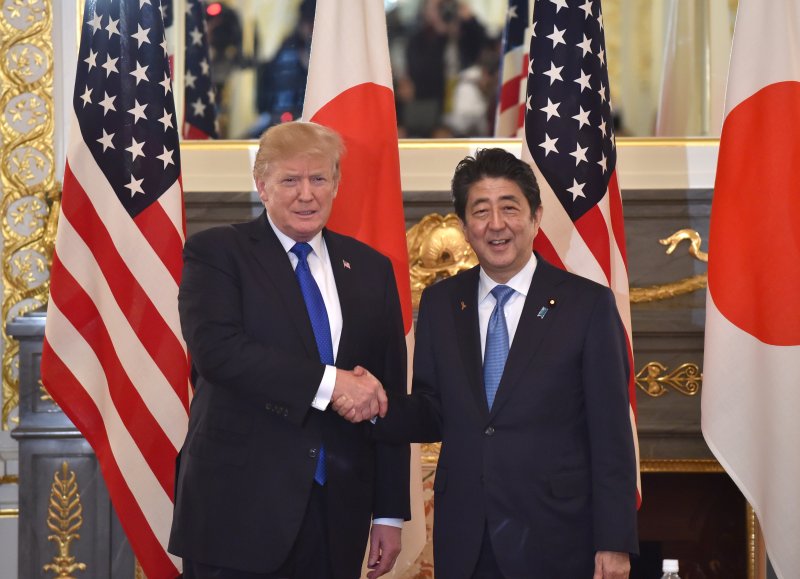begin quote from:
Tokyo, Beijing welcome U.S.-North Korea dialogue
Tokyo, Beijing welcome U.S.-North Korea dialogue
File photo of US President Donald J. Trump shaking hands with Japanese Prime Minister Shinzo Abe before a summit meeting at Akasaka Palace in Tokyo, Japan, 06 November 2017. FIle photo by EPA-EFE/KAZUHIRO NOGI.
SEOUL, March 8 (UPI) -- Beijing and Tokyo on Friday welcomed North Korea's offer to hold denuclearization talks with the U.S., saying it will continue to impose maximum pressure on the reclusive regime.
After a phone call with U.S. President Donald Trump, Prime Minister Shinzo Abe on Friday morning acknowledged Pyongyang's outreach to Washington, deeming it "an achievement of the international community's continued heavy pressure [on the North]."
South Korea, U.S. and Japan have endorsed the maximum pressure campaign on the North which seeks to isolate the regime from the international community economically and diplomatically to curb its nuclear and missile development.
Abe said while he appreciated the North's move toward talks, the allies' hardline policy on Pyongyang would continue for the time being, Maeil Business Daily reported.
"There is no change in the position of the United States and Japan that maximum pressure will continue until North Korea takes specific action to give up its nuke and missile program irreversibly and in a completely verifiable manner," he said.
The Japanese leader added that he agreed with the U.S. President that the bilateral alliance would continue "100 percent," and that he'd visit Washington in April for a summit.
"Japan will work closely with President Trump to resolve North Korea's nuclear and missile issue as well as North Korea's kidnapping of Japanese nationals," Abe said, Yonhap reported.
Later on Friday, China's foreign ministry expressed support for direct talks between Washington and Pyongyang.
"We welcome this positive signal by the U.S. and North Korea in having direct dialogue," Foreign Ministry Spokesman Geng Shuang said, according to South China Morning Post. "We hope that all parties can demonstrate political courage and make the right political decisions."
Beijing further called on Trump and Kim to show "political courage" to reduce tensions.
China has endorsed the resumption of the long-stalled Six Party Talks which were held between the two Koreas, the United States, China, Japan and Russia.
In 2005, North Korea reached an agreement with the six countries to halt its nuclear program in exchange for rewards and energy assistance.
However, the multilateral framework collapsed in 2008 when North Korea called off the deal after refusing inspectors to verify its compliance to dismantling nuclear facilities.
Related UPI Stories
Ads by Revcontent


No comments:
Post a Comment